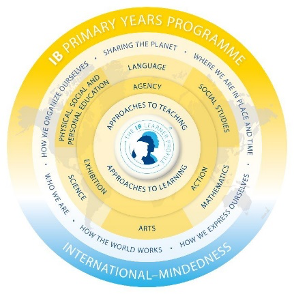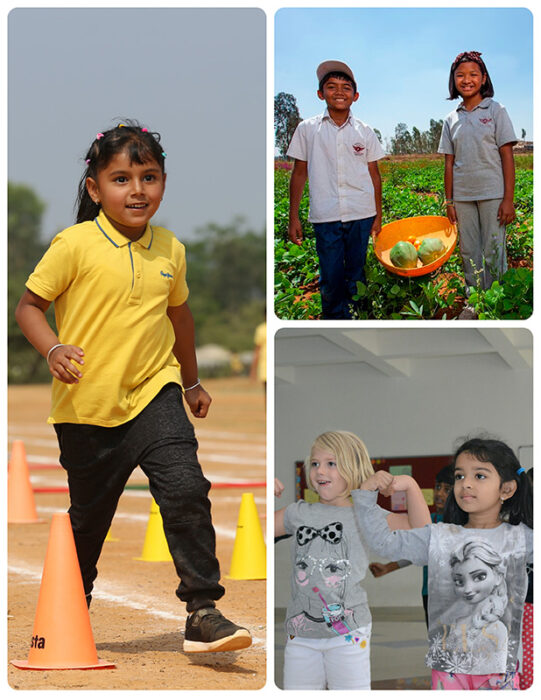At Candor our motto ‘know yourself, learn from each other’ demonstrates a clear commitment to having our students understand their cultural background, as well as that of others in our community.
With an internationally diverse student body of different nationalities, we encourage our students to be reflective and open-minded about our commonalities and differences.

At Candor we respond creatively and adaptively to the continual changes in education and society. Our classrooms are characterised by innovation, creativity, achievement and technological integration.
The Learning at Candor is transdisciplinary – students focus on six in-depth units of inquiry over the year through different disciplines with the help of a homeroom teacher.
In addition, students have classes in French, Hindi, Kannada, STEAM, Physical Education, Art, Music, Dance and Library. These are taught by specialist teachers. Information technology is used throughout the subject areas as a tool to support learning.
Candor students become confident communicators, inquirers and learners who are curious about the world. we support them to develop independence and the ability to use their learning to contribute to the world through their actions.

At Candor Students develop the central ideas for and develop the lines of inquiry for the issues and opportunities they are going to inquire into. They take full responsibility for the process and demonstrating the learner profile attributes. They assess their process of learning and at the same time, they do give feedback to their peers on their learning. They collaboratively initiate the actions that signify the global context.
The International Baccalaureate® (IB) chooses to define ‘international education according to the following criteria:
• Developing citizens of the world in relation to culture, language and learning to live together
• Building and reinforcing students’ sense of identity and cultural awareness
• Fostering students’ recognition and development of universal human values
• Stimulating curiosity and inquiry in order to foster a spirit of discovery and enjoyment of learning
• Equipping students with the skills to learn and acquire knowledge, individually or collaboratively, and to apply these skills and knowledge accordingly across a broad range of areas
• Providing international content while responding to local requirements and interests
• Encouraging diversity and flexibility in teaching methods
• Providing appropriate forms of assessment and international benchmarking
• The Primary School at Candor International School, Bangalore encompasses Grade 1-5, ages 6 – 10.
Students in the Primary School follow the IB Primary Years Programme (PYP), a curriculum framework that is learner-centred, inquiry-driven, concept-based and transdisciplinary. Our approach provides multiple points of entry for students and gives the teachers plenty of chances for small group and one-to-one facilitation.
Learning through inquiry allows plenty of opportunities for personalizing learning while building the cognitive, social and emotional, and communication skills necessary for success, in school and life. Inquiry capitalizes on natural curiosity, guides activities and makes learning authentic. Our learners are busy making meaning of their world in significant, relevant, engaging and universal contexts.
In the IB Primary Years Programme learning is arranged around six globally relevant themes that encompass the knowledge base for children in the 21st Century:
• Who we are
• Where we are in place and time
• How we express ourselves
• How the World Works
• How we organise ourselves
• Sharing the Planet
The Curriculum Framework encompasses the essential elements which balance knowledge and skills, the development of conceptual understanding, a demonstration of positive attitudes and taking responsible action. The aim is to:
• gain KNOWLEDGE that has relevance and significance globally as well as locally
• develop an understanding of CONCEPTS and make connections across their learning
• develop SKILLS that will help them across their learning as well as skills related to particular disciplines
• take ACTION based upon their learning
The subject areas are:-
• Arts
• Language
• Science
• Social studies
• Mathematics
Personal, social and physical education. The transdisciplinary model permeates the curriculum framework throughout the organising structure of the learner, learning and teaching and the learning community. Enhancements to the programme will provide greater clarity, flexibility and guidance in transdisciplinary learning and teaching by:
• strengthening and making more transparent the relationship between disciplinary and transdisciplinary learning
“Students learn better when they have agency in the learning process.” In the PYP: From principles into practice. The IB defines agency as, “the power to take meaningful and intentional action, and acknowledges the rights and responsibilities of the individual, supporting voice, choice and ownership for everyone in the learning community.”
The three keywords from this definition that we often focus on are voice, choice and ownership. In the PYP, we are actively exploring how we enable learner agency through our interactions, language and our learning engagements.
Within our primary classrooms, we foster a strong sense of community. Children are encouraged to work both independently and together as they explore a range of stimulating topics. Our aim is to nurture globally-minded citizens with inquiring minds.
Grades 4 and 5 students take part in the student council as part of the student agency in the curriculum. The student council process is democratic and led by the students themselves. The aim of this practice is to foster the Student Agency to tap the leadership qualities which helps them to volunteer or participate in various community services to become responsible citizens.
No: 537, Sriram Towers, Amarjyoti Layout, Domlur, Next to Shell Petrol Pump, Bangalore- 560071
Global Enquiries :
UK : +44-750-888 0877
Whatsapp : +91-77603 99993
Email: [email protected]